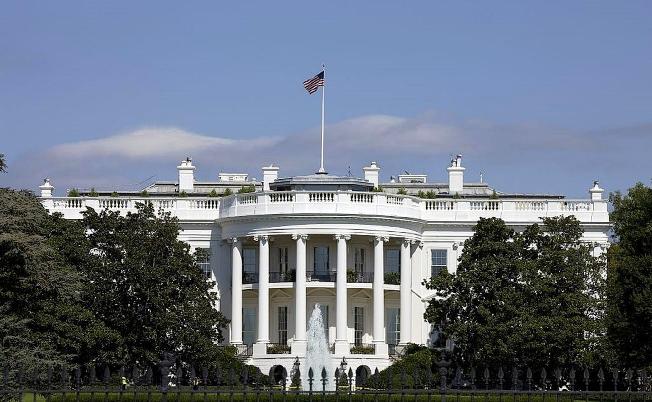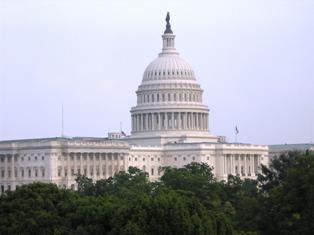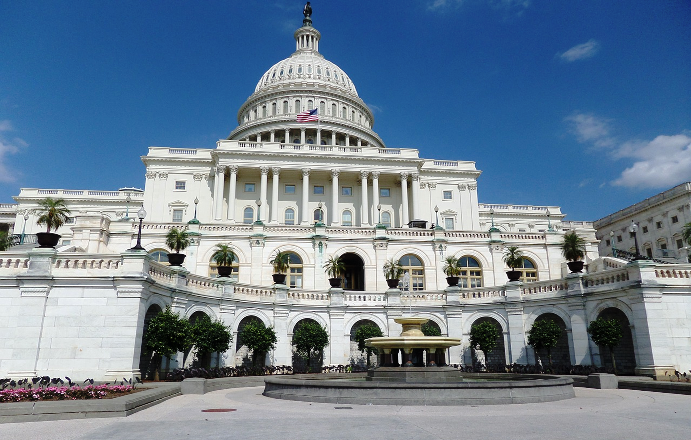FROM R.K.’s CORNER
 In the United States, we are in the midst of a brutal Presidential election which is polarizing an already divided nation, and even cutting deeply into relationships between and alienating Christian brothers and sisters. There is a deep-felt anger in the population that the government has failed them. The highly emotionally charged competition for the people’s hearts in the race for the Presidential candidacy fills the airways 24/7 via social media, television, and publications, engaging even those who have for years been on the sidelines of the political process.
In the United States, we are in the midst of a brutal Presidential election which is polarizing an already divided nation, and even cutting deeply into relationships between and alienating Christian brothers and sisters. There is a deep-felt anger in the population that the government has failed them. The highly emotionally charged competition for the people’s hearts in the race for the Presidential candidacy fills the airways 24/7 via social media, television, and publications, engaging even those who have for years been on the sidelines of the political process.
In this maelstrom, it is important that we who are followers of Jesus Christ have a clear view of what is our responsibility as citizen in God’s Kingdom, and the kingdom of this world — our country! In this issue, I am addressing this question, Should Christians be engaged in politics and the current culture? and presenting you some thoughts on that from the website http://www.gotquestions.org/. Their views very much express and correspond to those of ours.
My exhortation to my American friends: Voting is a privilege, don’t miss it!
HOW SHOULD A CHRISTIAN ENGAGE IN AND VIEW POLITICAL AND CULTURAL ISSUES?
As followers of Jesus Christ, what should be our attitude and our involvement with politics? It has been said that “religion and politics don’t mix.” But is that really true? Can we have political views outside the considerations of our Christian faith? The answer is no, we cannot. The Bible gives us two truths regarding our stance towards politics and government.
The first truth is that the will of God permeates and supersedes every aspect of life. It is God’s will that takes precedence over everything and everyone (Matthew 6:33). God’s plans and purposes are fixed, and His will is inviolable. What He has purposed, He will bring to pass, and no government can thwart His will (Daniel 4:34-35). In fact, it is God who “sets up kings and deposes them” (Daniel 2:21), because “the Most High is sovereign over the kingdoms of men and gives them to anyone he wishes” (Daniel 4:17). A clear understanding of this truth will help us to see that politics is merely a method God uses to accomplish His will. Even though evil men abuse their political power, meaning it for evil, God means it for good, working “all things together for the good of those who love him, who have been called according to his purpose” (Romans 8:28).
 Second, we must grasp the fact that our government cannot save us! Only God can! We never read in the New Testament of Jesus or any of the apostles expending any time or energy schooling believers on how to reform the pagan world of its idolatrous, immoral, and corrupt practices via the government. The apostles never called for believers to demonstrate civil disobedience to protest the Roman Empire’s unjust laws or brutal schemes. Instead, the apostles commanded the first-century Christians, as well as us today, to proclaim the Gospel and live lives that give clear evidence to the Gospel’s transforming power.
Second, we must grasp the fact that our government cannot save us! Only God can! We never read in the New Testament of Jesus or any of the apostles expending any time or energy schooling believers on how to reform the pagan world of its idolatrous, immoral, and corrupt practices via the government. The apostles never called for believers to demonstrate civil disobedience to protest the Roman Empire’s unjust laws or brutal schemes. Instead, the apostles commanded the first-century Christians, as well as us today, to proclaim the Gospel and live lives that give clear evidence to the Gospel’s transforming power.
There is no doubt that our responsibility to government is to obey the laws and be good citizens (Romans 13:1-2). God has established all authority, and He does so for our benefit, “to commend those who do right” (1 Peter 2:13-15). Paul tells us in Romans 13:1-8 that it is the government’s responsibility to rule in authority over us—hopefully for our good—to collect taxes, and to keep the peace. Where we have a voice and can elect our leaders, we should exercise that right by voting for those whose views most closely parallel our own.
 One of Satan’s grandest deceptions is that we can rest our hope for cultural morality and godly living in politicians and governmental officials. A nation’s hope for change is not to be found in any country’s ruling class. The church has made a mistake if it thinks that it is the job of politicians to defend, to advance, and to guard biblical truths and Christian values.
One of Satan’s grandest deceptions is that we can rest our hope for cultural morality and godly living in politicians and governmental officials. A nation’s hope for change is not to be found in any country’s ruling class. The church has made a mistake if it thinks that it is the job of politicians to defend, to advance, and to guard biblical truths and Christian values.
The church’s unique, God-given purpose does not lie in political activism, or reform. Our mission lies in changing hearts through the Word of God. When believers think the growth and influence of Christ can somehow be allied with government policy, they corrupt the mission of the church. Our Christian mandate is to spread the Gospel of Christ and to demonstrate His standards through our daily living. Only as the hearts of individuals in a culture are changed by Christ will the culture begin to reflect that change.
Believers throughout the ages have lived, and even flourished, under antagonistic, repressive, pagan governments. This was especially true of the first-century believers who, under merciless political regimes, sustained their faith under immense cultural stress. They understood that it was they, not their governments, who were the light of the world and the salt of the earth! They adhered to Paul’s teaching to obey their governing authorities, even to honor, respect, and pray for them (Romans 13:1-8). More importantly, they understood that, as believers, their hope resided in the protection that only God supplies. This holds true for us today. When we follow the teachings of the Scriptures, we become the light of the world as God has intended for us to be. (Matthew 5:16).
Political entities are not the savior of the world. The salvation for all mankind has been manifested in Jesus Christ. God knew that our world needed saving long before any national government was ever founded. He demonstrated to the world that redemption could not be accomplished through the power of man, his economic strength, his military might, or his politics. Peace of mind, contentment, hope and joy—and the salvation of mankind—is accomplished only through His work of faith, love, and grace.
This issue is divided by two opposite views among Christians. On one hand there are those who spend many hours writing to their Congressmen, picketing abortion clinics, campaigning for conservative candidates and using all means available to influence and improve the quality of government to conform it to the Christian worldview. At the other extreme are those who take Jesus’ words “My kingdom is not of this world” (John 18:36) as their motto, refusing to vote or get involved in any effort to affect the culture in which we live.
No question, we must be good citizens. Romans 13:1 tells us that Christians should be exemplary in their conduct regarding the laws of the land, choosing to disobey only those laws/rules that directly contradict the revealed Word of God. Abortion, for example, is an abomination, but no one is forced by our government to have an abortion, as is the case in China. The Chinese Christians who defy the law and refuse to have abortions are obeying the biblical commands “choose life” (Deuteronomy 30:19) and “you shall not murder” (Romans 13:9), thereby obeying God more than man!
Perhaps the best way to understand our responsibilities in the social/cultural arena is to look to Jesus for our example. Jesus lived in one of history’s most corrupt societies. But He perfectly maintained His Father’s perspective on social and political matters, even though He lived in a society that was every bit as pagan and corrupt as today’s culture. Cruel tyrants and dictators ruled throughout the region, and the institution of slavery was firmly entrenched. Legal and economic oppression of the Jews by Rome was rampant, dwarfing anything we experience today. Even in the face of such tyranny, Jesus never issued a call for political changes, even by peaceful means.
He did not come to earth to be a political or social reformer, rather, He came to make new creatures (His people) holy through the saving power of the Gospel and the transforming work of the Holy Spirit. He knew governments and institutions are made up of people. When people’s hearts are changed by Christ, godly governments and institutions will follow. If the hearts of the people are corrupt, getting them together in groups only multiplies the corruption. What we need is not better government, but better men and women in government!
 So what is a Christian to do? Can Christians shun all political and social efforts to affect the culture? Yes, if our consciences convict us to do so and as long as our motivation is pure and not an effort to appear holier than those who do choose to be involved. Pride is too often the by-product of completely withdrawing from the culture. We are to be in the world, but not of it, and part of being in the world is modeling Christ-likeness for the world and Christian love toward one another.
So what is a Christian to do? Can Christians shun all political and social efforts to affect the culture? Yes, if our consciences convict us to do so and as long as our motivation is pure and not an effort to appear holier than those who do choose to be involved. Pride is too often the by-product of completely withdrawing from the culture. We are to be in the world, but not of it, and part of being in the world is modeling Christ-likeness for the world and Christian love toward one another.
Can we picket, campaign, and lobby our elected leaders on issues of concern to us? Certainly, as long as we keep the ultimate goal in mind—to win people to Christ. Too often that goal and the activities described above are in conflict. Cruel activism, no matter what the motivation, will not convince the unbeliever we serve a loving and merciful God who will forgive sin.
Even the most gracious efforts to “clean up the culture” will not protect or expand the cause of Christ. Ours is a spiritual battle against worldly ideologies and dogmas that are arrayed against God, and we achieve victory over them only with the weapon of Scripture. In the words of the Apostle Paul, “For though we walk in the flesh, we do not war according to the flesh. For the weapons of our warfare are not carnal but mighty in God.. ..bringing every thought into captivity to the obedience of Christ” (2 Corinthians 10:3-5).
Those who endeavor to tidy up the culture for the culture’s sake are not only missing the point, they are misunderstanding the reason God leaves us in the world — to be His witness to the lost and condemned. Such a mission is far more “good and profitable to men” (Titus 3:8) than any amount of social or political activism.

